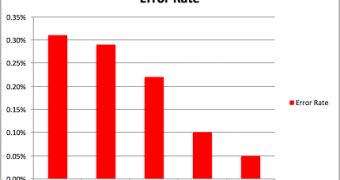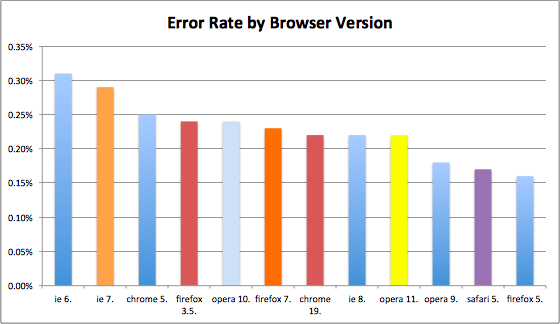Microsoft has greatly improved Internet Explorer in the last couple of years and the two new versions available in Windows 8 and 8.1 are the living proof.
But a research conducted by Sauce Labs reveals that Internet Explorer is still getting more crashes than its main rivals, including here Mozilla Firefox and Google Chrome.
According to the findings, Internet Explorer performs the worst, reaching an error rate of .25 percent. Version-wise, IE6 and IE7 have experienced the highest error rates with .31 percent and .29 percent, respectively.
Firefox, Safari, and Opera top the charts, as they’re supposed to provide an almost bug-free experience.
On the good side, the research indicates that Internet Explorer is getting better over the years, so IE10 is clearly a pretty stable choice right now.
“For recent browser versions, Safari 6 has the highest error rate in our service at .12%, which is less than half of IE 6’s .31% error rate. Chrome 27 and Firefox 22 have virtually nonexistent error rates, with IE and Opera falling in the middle,” Sauce Labs explained.
The study does confirm that Microsoft has managed to significantly improve Internet Explorer and future versions are expected to provide an even better experience.
“Error rates for IE have been getting significantly lower with each new version. Microsoft has been so good at squashing their historically high error rates that IE 10 has an impressive 0.05% error rate,” the research papers read.
“Microsoft has really been pushing their new version of Internet Explorer as the most modern and high-performing version of IE. You’ve may have seen their nostalgia-tinged IE 10 commercial. The data we have on browser error rates suggests that their claims may have quite a bit of merit.”
Even though IE10 isn’t yet topping the charts, Microsoft will most likely be very pleased with these results, as the company has invested big lately to promote the modern version of its in-house browser.

 14 DAY TRIAL //
14 DAY TRIAL // 